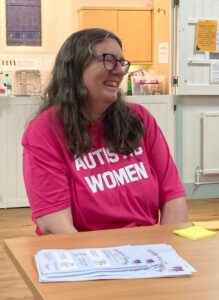The main part of our July meeting was a presentation by two of our members who are autistic. Cath and Louise explained that autism is a type of neurodiversity, which means their brains operate in different ways to those of us who are neurotypical, and they see the world in different ways. Other neurodivergent conditions include dyslexia, dyscalculia, misphonia, dyspraxia, stammering, ADHD and Tourettes Syndrome. It is not uncommon to be neurodivergent in more than one way.
Despite legislation which obliges organisations to make reasonable adjustments to remove barriers, autistic people still find difficulty navigating our society and may often feel like square pegs being forced into round holes. They often face services which do not meet their needs in health, education, employment and housing.
Indications
There are many things that we may notice about someone with autism:
- appear shy
- look aloof
- talk incessantly
- discuss one thing at length
- eschew small talk
- miss social cues
- barge in
- reveal personal things
- miss the rhythm of conversation
- interrupt a lot or hardly say a thing
- Arrive early
- leave abruptly
- apologise frequently
- be anxious, honest or frank
- get confused
- miss important things
- notice details
- worry a lot about things that have happened, are happening or are going to happen
- difficulty explaining things – struggle to find the words to express how we feel
- behaviour affected by tiredness and stress
- some days are better than others – can seem inconsistent
- stresses of overstimulation and masking which can cause atypical behaviour
Behaviour
People with autism often find themselves overstimulated, with their senses overwhelmed by their environment: bright, flickering lights, too much background noise (fridges, clocks, cars, alarms), irritation of touch (labels, lotions, wind and rain, unwelcome touch from others), tastes and texture of food or smells which seem overpowering.
To compensate for this overstimulation you may see someone using soothing behaviours: swaying, rocking, pacing, jiggling legs, waving or tapping hands, fiddling with pens or jewellery or hair, nodding or daydreaming.
Body Language and speech
Autistics find it very difficult to read body language and may not pick up on clues or may misinterpret them. They instinctively look at mouths when people speak, rather than eyes, which may appear distracted or untrustworthy to others. They often miss signs of frustration and anger, so are surprised by outbursts.
They rely more on words, but find it hard to interpret tone of voice. They find it difficult to grasp hints or nuance and indirect speech. They often misinterpret this which causes miscommunication. Being afraid of misunderstandings, they compensate by overexplaining and repeating.
People with autism may forget to say ‘hello’, or ‘please’ or use names. They cannot see the point of small talk, particularly if distressed or excited. They can appear tactless and lacking deception, or too personal, which may leave them vulnerable. They may be ‘too honest’.
Rules
People with autism like rules because they help make sense of the world. Their problem is that many social rules are not explicit so they may not understand social norms. They may miss important rules and ignore stupid rules, which can cause problems.
Many undiagnosed children will suffer for years before getting help. Queues for diagnosis are long and the rubric was designed to diagnose males back in the 1940s. Many children grow up being excluded, avoided or attacked without knowing why.
As written by Marc Segar in 1997: Autistic people have to understand scientifically what non-autistic people already understand instinctively.
Meltdowns
Imagine living every day in a state of anxiety because the world seems overwhelming and people don’t seem to make sense. This leads to masking and covering up, mimicking as coping strategies. Other people think they are coping, but they are simply acting and when they can no longer sustain this, it may result in a meltdown. Not an everyday behaviour, but the result of stress and trauma. They may look like tantrums, but are not deliberate.
When overwhelmed, an autistic woman (more so than men) may shutdown; unable to talk or reason for hours or sometimes days.
By the end of the day someone with autism needs a lot of relaxation and rest. They often need quiet, darkness, stillness and time to recover.
Outcomes
Someone who does not understand their condition is likely to become anxious, worrying, ruminating and liable to panic. It is easy for them to become depressed, feel grief and sadness and feelings of hopelessness.
Autistics are nine times more likely to than neurotypicals to commit suicide.
Advantages
Autism does cause problems but there are also some advantages to thinking in a different way to others. Some of these advantages can be:
Imagination
- thinking of new, original things
- putting things together in original ways
Deep learning
- good at details
- and looking at larger picture
- great focus and memory
Loyal and trustworthy
Honest and direct
Fun to be around
Observant – have to be, to survive!!
Visual thinkers
What can we do?
Autism awareness is the first step to understanding and helping those living with autism. You can find out more here or by NHS.
Know the signs and symptoms, be patient and give the person time and space to express themselves. Be calm, listen and talk in clear straightforward language. Read the list compiled after the talk on things we can do as individuals and as a club. Autism feedback
Thanks to Cath and Louise for sharing this presentation with the club and for this article.
Did you know? Some famous people with autism:
Greta Thunberg
Daryl Hannah
Chris Packham
Elon Musk
Anne Hegerty
Anthony Hopkins
Susan Boyle
Induction
Barbara was able to welcome Louise as a full member of SI Salisbury.

Next steps
The Health Group is working on some ideas for improving women’s health. One strand will be women with autism awareness.

